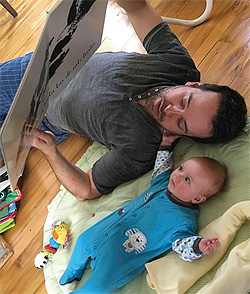Sleep at around 4 months
![]() Gradually you will recognize more and more of your baby’s signs of fatigue.
Gradually you will recognize more and more of your baby’s signs of fatigue.
At 4 months, the average amount of time a baby sleeps is 14 to 15 hours per day. Babies will start to sleep longer through the night.
At about 4 months, babies usually have a more regular and predictable daily routine. Because you’ve paid close attention to your baby from the time of birth, she will feel safer and more secure. She will be able to wait a bit longer for things. She learns to comfort herself by putting her hand in her mouth. Little by little she learns to fall asleep on her own. Beginning at between 4 and 6 months, some babies won’t need to feed during the night anymore. Others will still need to – possibly even more so than during the weeks before.
Bedtime routine

![]() The bedtime routine helps your baby get ready to sleep.
The bedtime routine helps your baby get ready to sleep.
Photo: Elisabeth Martel-Olivier
It’s a good idea to make bedtime a relaxed, happy time. Repeating the same actions every night will create a bedtime routine that makes going to sleep easier. Turn on a night light in the hall and leave the bedroom door partly open.
If you stick fairly close to your routine each day, your baby will start to understand when it’s bedtime. For example, develop a routine of a warm bath, quiet game, a story, soft music or a song.
A lot of parents enjoy this time of the day with their baby, and take the time to rock her to sleep. Others prefer that the baby learns to fall asleep on her own.
If you want, once the routine and quiet time are finished, put your baby in her crib even if she isn’t fully asleep. When your baby learns to go to sleep on her own it means she can go back to sleep on her own in the middle of the night if she wakes up during a period of light sleep.
Sleeping through the night
![]() There’s no right or wrong way in your bedtime routine. The important thing is for you to feel comfortable with the routine you choose.
There’s no right or wrong way in your bedtime routine. The important thing is for you to feel comfortable with the routine you choose.
Sleeping through the night is what adults do; babies have different sleep patterns. A baby’s sleep schedule can in fact vary quite a bit from one baby to the next. “Sleeping through the night” generally means five or six hours of sleep between 11 p.m. and 8 a.m. About 70% of 3-month-old babies sleep five hours at night; 85% do at 6 months, and 90% at 10 months.
Follow your baby’s rhythm and needs. When feeding at night, you can keep things calm and quiet so she learns the difference between night and day. For example, keep the lights very dim and resist the very natural urge to speak to her.


